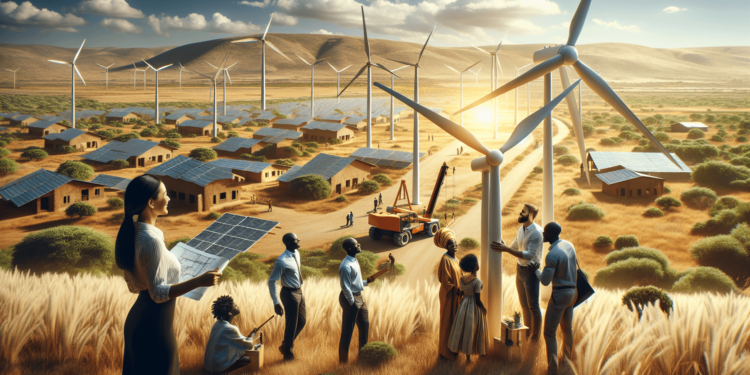Energy is crucial in powering economies and improving people’s lives today. In Africa, there is a growing emphasis on sustainable energy solutions. The goal is to boost economic growth, generate jobs, and bring electricity to communities. Many organizations and companies are investing in renewable energy projects across the continent to bridge the energy gap and spur development.
This article will delve into the significance of investing in sustainable energy in Africa and its potential impact on the continent’s future.
Empowering Africa: Investing in Sustainable Energy
Global investors can be important partners in advancing sustainable energy projects in Africa. They bring financial resources and expertise to support clean power generation in different African countries. Private sector partners in Nigeria have funded renewable energy projects to improve energy access in rural areas. Companies such as ABB use their experience to enhance energy investments in countries like Ghana and Zambia.
Investment banking institutions help with financing and advisory services to promote clean energy solutions in West Africa. Government policies and incentives also play a role by encouraging renewable energy projects and attracting private capital for infrastructure development in countries like Benin and Uganda. Organizations like the Power Africa network advocate for clean power and provide technical assistance to create a sustainable energy future in Africa.
African Energy Markets
Overview of the Current Energy Landscape in Africa
The energy in Africa comes from various sources like solar, wind, hydropower, and biomass. These sources help meet the region’s energy needs.
Renewable energy projects are vital for clean power and better energy access in rural areas of Sub-Saharan Africa. Countries like Nigeria, Ghana, Uganda, and Zambia are partnering with private companies such as ABB to develop infrastructure for clean energy.
By working with private investors and financial services, governments can implement sustainable energy projects that promote economic growth and benefit consumers. Companies like Eaton and Engie offer technical support to navigate energy markets in West Africa.
With a focus on renewable energy and clean power, Africa is moving towards a greener future in line with global efforts for sustainability.
Challenges and Opportunities for Energy Investments in Africa
Investing in Africa’s energy markets has challenges and opportunities for sustainable growth. The distribution of investments across African countries varies. Inclusive financing approaches are needed to bridge the energy finance gap. Global investors can help by partnering with local companies and governments. This can advance clean power generation projects in sub-Saharan Africa. Private sector partners bring experience and technical assistance, enhancing clean energy infrastructure.
This boosts power generation capacity. Investments in renewable energy projects offer economic development potential. They attract billions in financing for sustainable Africa scenarios. Private capital and financial services help maximize investments’ impact in rural areas, like Uganda, Zambia, and Ghana. Organizations like ABB support clean energy promotion in West Africa and other African countries through advocacy and advisory services.
Investing in Africa Energy
The Role of Global Investors in Advancing Sustainable Energy Projects
Global investors can help advance sustainable energy projects in Africa. They can partner with local companies and governments to finance renewable energy projects. By providing expertise, access to capital, and technology, global investors can support clean power generation in countries like Nigeria, Ghana, and Zambia.
These partnerships can address the energy investment needs in Sub-Saharan Africa, where demand is high. Global investors can use their financing experience to support transactions and advisory services for clean energy initiatives in African countries. Through strategic investments and technical assistance, private sector partners can maximize their impact. This can lead to increased energy generation capacity and improved electricity access in rural areas.
In the sustainable Africa scenario, global investors can advocate for clean energy solutions. They can build networks with key stakeholders and mobilize private capital to develop renewable energy projects across West Africa and beyond.
Benefits of Investing in Renewable Energy Sources in Africa
Investing in renewable energy sources in Africa has many economic benefits. It can create jobs and support local communities. Developing these projects also helps build infrastructure in African countries, making the region more sustainable.
These investments not only increase clean energy production but also bring in private funding for energy projects, which boosts economic growth. They also promote clean energy solutions for people in rural and urban areas, improving access to electricity and supporting health and communication networks.
Partnering with private companies to invest in renewable energy projects in Africa supports efforts for a sustainable Africa. Companies like ABB, with experience in renewable energy markets, play a vital role in providing technical assistance and advice for clean energy projects throughout the continent.
African Natural Gas as a Sustainable Energy Source
Exploring the Potential of African Natural Gas Reserves
Africa has a lot of natural gas. The gas is in countries like Nigeria, Ghana, Uganda, Zambia, Benin, and West Africa. People think there is a big opportunity to use this gas for making energy in a good way.
Africa can use private money, work with companies like ABB, get help from investment banks, and work with experienced partners. By getting billions in investments, these countries can improve their energy systems with new technology and projects. They can also focus on clean energy and better ways to communicate to help rural areas.
Africa can make progress by promoting, advising, and building skills. This will help Africa use its natural gas better. It will also help make more power and grow the economy.
Benefits and Challenges of Utilizing Natural Gas for Energy Production in Africa
Natural gas has significant benefits for energy production in Africa. It promotes clean power generation and boosts infrastructure capacity. Private sector partners focusing on renewable energy projects can use natural gas to support Africa’s energy investment needs.
Despite the positive impact of natural gas projects in sub-Saharan Africa, challenges exist in financing clean energy initiatives, especially in countries like Nigeria and Ghana. Companies with energy market experience can help navigate these challenges by providing advisory services and financial assistance for successful project implementation.
Natural gas projects can bring a positive transformation to rural areas in sustainable Africa scenarios. This benefits consumers and expands access to clean power. Private capital investments in energy markets across African countries, reaching billions, highlight the importance of utilizing natural gas in driving economic growth and improving energy access, especially in regions like West Africa and Uganda.
The adoption of natural gas as an energy source holds great promise for Africa. This is supported by technical assistance from companies like ABB and communication networks advocating for sustainable practices.
Sustainable Energy Initiatives in Africa
Government Policies and Incentives Supporting Sustainable Energy Development
Government policies in Africa support renewable energy projects. They offer incentives like tax breaks and subsidies. These policies encourage private sector partners to invest in clean power generation and infrastructure projects.
The goal is to expand access to clean energy for consumers in rural areas. African countries provide financial services and technical assistance to attract private capital and investments.
Incentives, such as feed-in tariffs and favorable financing terms, help promote sustainable energy development. Companies like ABB, present in Nigeria, Uganda, Ghana, and Zambia, play a vital role in advancing renewable energy projects.
Advocating for clean power initiatives, private sector companies contribute significantly to the African energy landscape. Government-led advocacy and policies create a conducive environment for clean energy investment, benefiting both the economy and the population’s health.
Innovative Renewable Energy Projects Driving Economic Growth in Africa
Innovative renewable energy projects in Africa, like solar and wind projects by companies such as Bazaruto Renewables and Berkeley Energy, are boosting economic growth in Sub-Saharan Africa. These projects increase clean power generation and create job opportunities, fueling economic development in Nigeria, Ghana, Zambia, and Uganda.
Public-private partnerships, like those involving companies such as Capricorn and CrossBoundary LLC, play a key role in advancing sustainable energy initiatives. These partnerships use private capital to back infrastructure projects, improve clean power access in rural areas, and offer technical assistance and advisory services. By encouraging investments in clean energy and promoting a sustainable Africa, these partnerships support economic growth and help develop a greener energy future in African countries.
Networking Opportunities for Energy Professionals
Business-to-Business Matchmaking Events for Energy Industry Stakeholders
Participating in Business-to-Business Matchmaking Events for Energy Industry Stakeholders in Africa has many benefits. These events provide networking opportunities that can lead to collaborations. They bring together global investors, businesses, and government entities in the African energy sector. By facilitating interactions, these events create a platform for sharing expertise and best practices. This helps drive the development of clean energy projects across Africa.
These events play a key role in addressing challenges and opportunities for energy investments in Africa. They focus on natural gas utilization and promoting renewable energy sources. Private sector partners can use their experience and financial services to support clean power generation capacity. Regions like Nigeria, Ghana, Uganda, and Zambia benefit from these partnerships.
Matchmaking events also offer technical assistance, financing, and advisory services to enhance sustainability in Africa. They support infrastructure projects, promote clean energy initiatives, and advocate for more private capital investments in West Africa.
Networking Reception at Westin Vendome, Paris
The Networking Reception at Westin Vendome, Paris is a great opportunity for energy professionals. It focuses on investing in Africa’s energy sector.
Attendees can connect with partners and companies working on renewable energy projects in Africa. The event will cover clean power generation, financing for infrastructure projects, and private sector partnerships.
Industry experts, including key players like ABB, will share insights. This networking reception allows attendees to explore impact investments, exchange experiences in energy markets like Nigeria and Ghana, and plan for clean energy growth in sub-Saharan Africa.
It’s a chance to network with private capital firms, financial services providers, and investment banking entities active in energy investments. Professionals can boost their presence in Africa’s energy markets and work on sustainable solutions for rural areas and consumers.
Country Spotlights on Africa Energy Trends
Exploring Energy Sector Developments in Key African Countries
Recent developments in the energy sector of some African countries are focusing on renewable energy projects to improve power generation capacity.
Countries such as Nigeria, Ghana, Uganda, and Zambia are specifically targeting infrastructure projects to increase access to clean power in rural areas.
Private sector partners and companies like ABB are making significant investments in clean energy to promote sustainable practices in Africa.
Power Africa is actively involved in facilitating transactions and offering technical support, while partner investments are strengthening the energy network in Sub-Saharan Africa.
Private capital and financing initiatives in West Africa and other African regions are also backing renewable energy projects, which are positively impacting energy markets.
African countries are emphasizing clean energy solutions by using technology and expertise to enhance energy investments for the benefit of consumers and communities.
Through advisory services and financial assistance, these countries are laying the foundation for a more sustainable energy future throughout Africa.
Africa Energy Outlook: Sustainable Growth and Future Prospects
Investing in energy in Africa has challenges and opportunities for growth. The continent has diverse energy needs and landscapes. Navigating infrastructure projects across countries is important. Partnerships with the private sector, like ABB, bring technical help and finances for clean energy. Global investors, experienced in renewable energy, can support projects in Nigeria, Ghana, Uganda, and Zambia. Companies like Engie focus on clean power to increase renewable energy in sub-Saharan Africa.
Private capital firms, such as Investec, advocate for clean energy projects in West Africa. These investments are crucial for economic and health benefits. Africa’s energy markets are ready for impactful investments to fill a $250 billion energy gap by 2030.
FAQs
Sustainable energy is renewable energy sources like solar and wind power. It’s important for Africa to combat climate change, reduce energy costs, and increase energy access. For example, solar panels can provide electricity in remote areas without access to the grid.
Investing in sustainable energy in Africa can empower the economy by creating new jobs, reducing energy costs, attracting investment, and improving energy access for communities. Examples include the development of solar power plants, wind farms, and microgrids in rural areas.
Some examples of sustainable energy projects in Africa include solar power installations in rural communities, wind farms along the coast, and hydropower plants on rivers.
Challenges in investing in sustainable energy in Africa include funding constraints, political instability, inadequate infrastructure, and lack of skilled workforce. These can be addressed by partnering with local organizations, governments, utilizing innovative financing mechanisms, and focusing on capacity building initiatives.
Individuals and organizations can get involved in empowering Africa through sustainable energy investments by supporting renewable energy initiatives, investing in clean energy projects, partnering with local communities, and advocating for policies that promote sustainable energy practices. Joining organizations like Power Africa or investing in solar panel projects in rural areas are tangible ways to make a difference.









